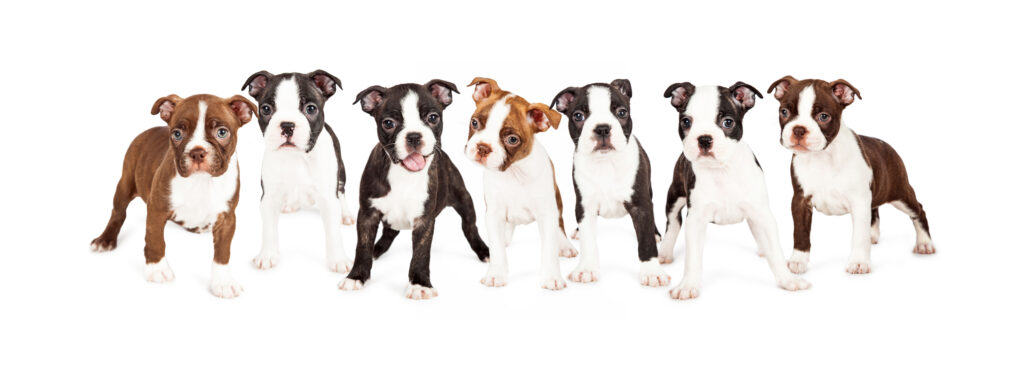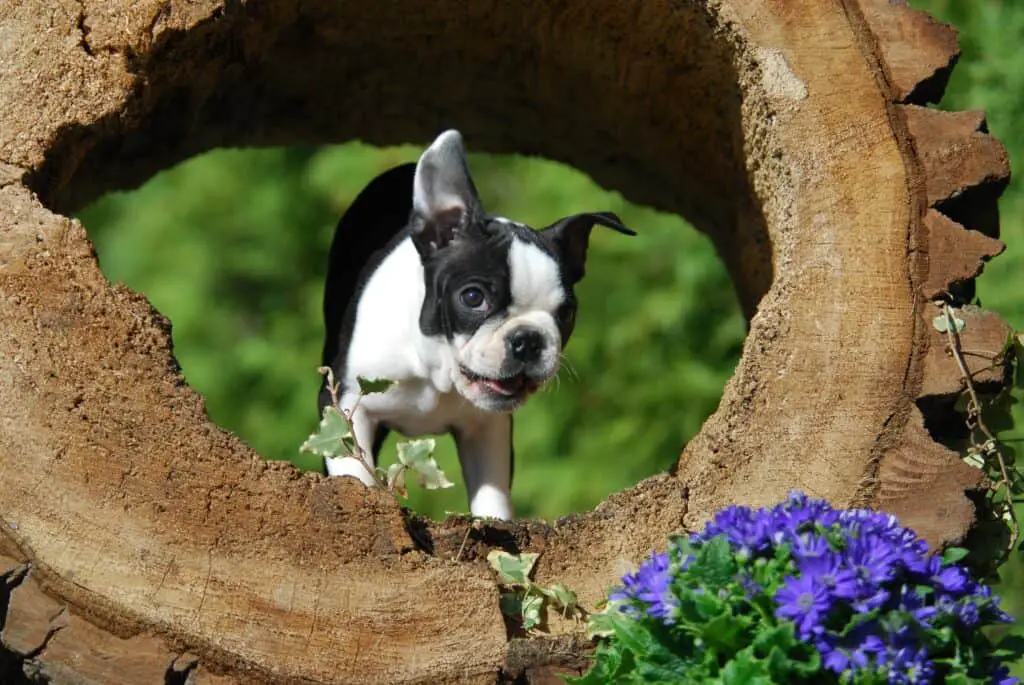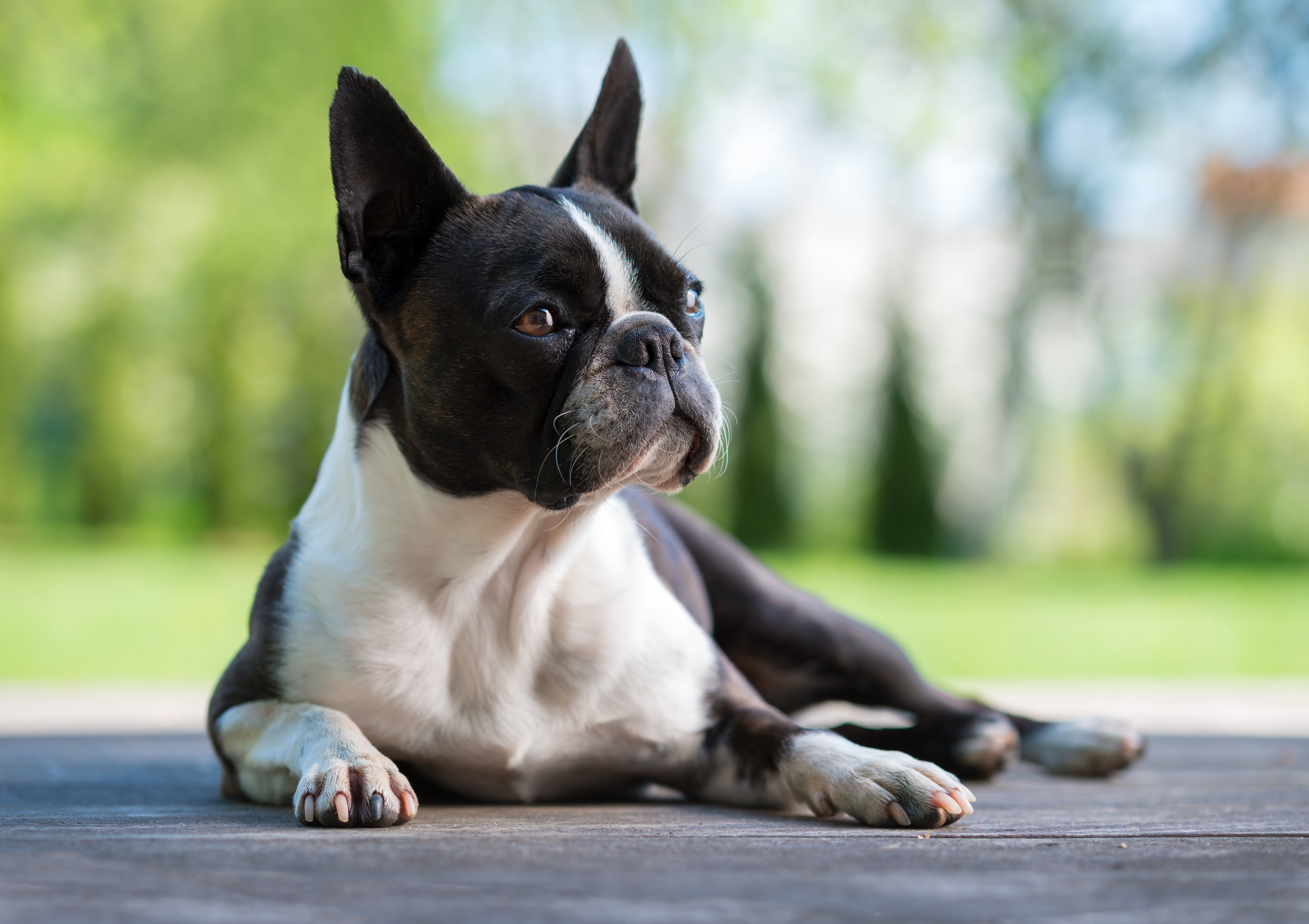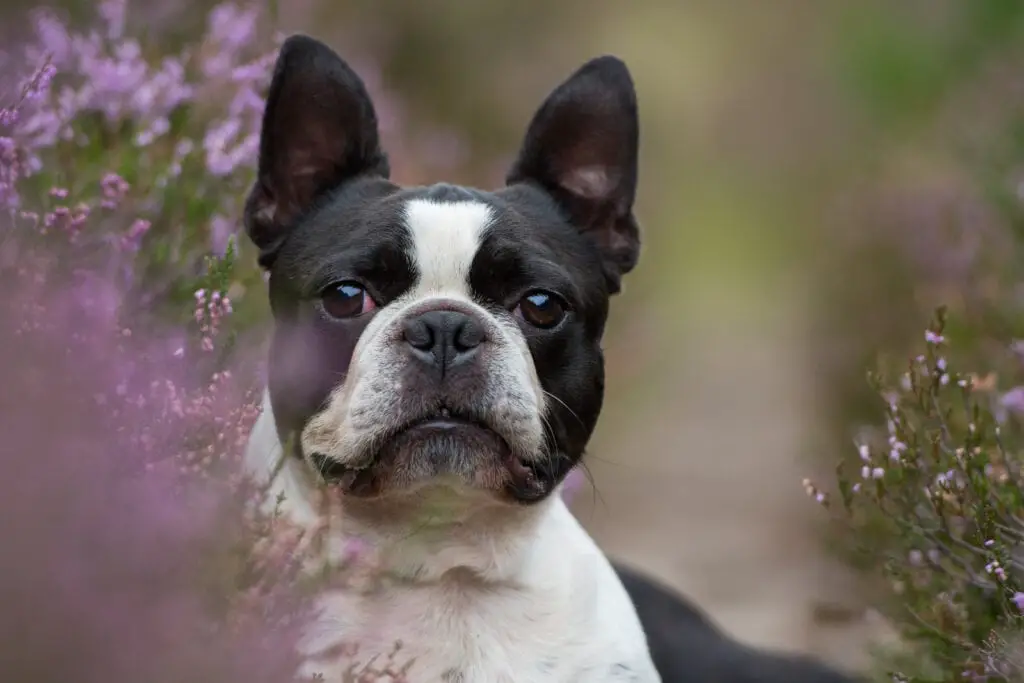Our website is supported by our users. We sometimes earn money when you click an affiliate link and make a purchase. This is at no extra cost to you and helps us to create quality content. Thank you for your support. For all that have shown us such wonderful support, we thank you from the bottom of our hearts!
The Boston Terrier, affectionately known as the “American Gentleman,” is a companion dog breed that originated in the United States.
With their distinctive tuxedo-like black and white coat, these small dogs have captured the hearts of many and consistently rank as one of the most popular breeds for families.
They are well-mannered, friendly, and have a personality that strikes the perfect balance between affectionate and lively.

Your Boston Terrier will likely be an adaptable companion, getting along well with kids and other pets, and they are known for their gentle nature.
Their small size and moderate exercise needs make them ideal for apartment living, although they enjoy playtime and walks.
While their love and loyalty make them a joy to train, prospective owners should be aware of the breed’s potential health issues and the importance of regular vet checkups.
Key Takeaways
- This breed is a charming and popular companion dog from the United States.
- They are known for their friendly nature, making them great for families and suitable for both houses and apartments.
- Owners should prioritize regular health screenings and exercise to maintain their Boston Terrier’s well-being.
History
Originating in the United States, the Boston Terrier has a rich history that began in the late 19th century.
Your journey into the past of this charming breed will take you back to 1875 when Robert C. Hooper of Boston purchased a dog known as Judge.
With its lineage rooted in the Bulldog and the White English Terrier, Hooper’s Judge is often regarded as the patriarch of the Boston Terrier breed.
The creation of the breed was a methodical process. – Judge’s specific physical characteristics, such as his compact yet muscular build, were bred to achieve a distinctive look and temperament.
From these carefully selected traits, a new breed took shape, one that was known for its friendly disposition and striking tuxedo-like coat.
Radcliffe College friends gave renowned deaf and blind author and lecturer Helen Keller a Boston Bull Terrier named Sir Thomas, affectionately known as Phiz.
In 1893, the American Kennel Club (AKC) officially recognized the Boston Terrier, making it one of the first breeds created in America to receive such distinction.
| Event | Description |
|---|---|
| Acquisition of Judge | Starting point of the breed. |
| Breed Development | Selective breeding between Bulldogs and Terriers to create the breed. |
| AKC Recognition | Granted in 1893, a milestone for this American-original breed. |
Your knowledge of the Boston Terrier now includes its transition from a crossbreed with working-class roots to a beloved companion and a refined show dog.
This breed’s journey encapsulates a notable part of canine history and encapsulates its development from a robust fighter to a friendly and affectionate family pet.
In addition, the breed also takes pride in being an endearing mascot for countless schools and organizations across the nation.
Physical Characteristics

The Boston Terrier is a small and compact breed with a distinctive tuxedo coat.
Your Terrier will exhibit a balance of muscularity and refinement with a short coat that comes in recognizable colors and patterns. Let’s explore their key physical traits.
Height Male
Male Boston Terriers typically stand about 15 to 17 inches tall at the withers.
Height Female
Female Boston Terriers closely mirror males in height, often measuring within the same range of 15 to 17 inches tall at the withers.
Weight Male
A healthy male Boston Terrier generally weighs between 12 to 25 pounds.
Weight Female
Female Boston Terriers tend to weigh slightly less, ranging from 12 to 25 pounds, depending on their individual size and conditioning.
Eye Colors
Your Boston Terrier’s eyes are alert and expressive, typically featuring a dark brown color.

Coat Colors
The short coat comes in black, brindle, or seal and is paired with white markings, giving them their distinctive “tuxedo” appearance.
Coat Types
Boston Terriers have a short coat that is smooth and easy to groom, reflecting their clean-cut, stylish look.
Overview of the Physical Characteristics of the Boston Terrier
Your Boston Terrier’s overall appearance is one of a lively, highly intelligent dog that is small in size but sturdy in build.
Key features include their square, flat skull, broad chest, and a short body that contributes to their compact size.
With a life span of about 11 to 13 years, they often retain their puppy-like energy well into adulthood.
Their distinctive markings and friendly face exude the breed’s well-known affability.
Temperament & Training
Boston Terriers are known for their personable and affectionate nature.
With a friendly disposition, they easily adapt to family life, thriving on companionship.
In your home, you’ll likely find them shadowing you, eager for interaction.
Temperament:
- Intelligent: Quick learners with a keen understanding of their family’s routines.
- Friendly: Sociable, with a penchant for making friends with both humans and other dogs.
- Playful: A playful energy that brings a lively spirit to your daily life.
Training your Boston Terrier requires a blend of firmness and positivity.
They can exhibit stubborn streaks, so it’s essential to be consistent and patient.

Training Tips:
- Use positive reinforcement: Reward good behavior to promote a willingness to learn.
- Exercise: Regular activity will help manage their energy levels.
- Mental Stimulation: Challenge their minds to keep them engaged and prevent boredom.
Bostons can excel in agility due to their energetic and dexterous nature, making agility training both a physical activity and a mental workout.
Agility Training:
- Ears and Tails Wagging: You’ll see your Boston’s excitement in their wagging tail and perky ears when they navigate obstacle courses.
- Obedience: Develops listening skills and builds the foundation for complex commands and agility work.
Integrate play with training to satisfy their exercise needs and infuse fun into learning.
Remember, a well-exercised Boston Terrier is a well-behaved one.
Keep their routine varied to burn off pent-up energy and elicit positive behavior.
Health Issues
Boston Terriers, like all breeds, are susceptible to certain health problems.
Your awareness of these issues can be crucial in early detection and treatment.
Brachycephalic Syndrome
As a one of the brachycephalic breeds, Boston Terriers can experience breathing difficulties due to their short muzzles.
This can lead to snoring and, in some cases, more serious respiratory issues.
- Breathing
- It’s essential to monitor your Boston Terrier for any changes in breathing or excessive snoring.
- These could be indicative of health concerns related to their brachycephalic nature.

- Cataracts:
- One common vision problem is cataracts, which can cause cloudiness in the lens of the eye and potentially lead to blindness if left untreated.
- Regular veterinary check-ups can help detect eye issues early on.
- Patellar Luxation:
- This joint issue occurs when the kneecap dislocates from its normal position, causing pain and difficulty walking. Your vet can examine for this during routine check-ups.
- Corneal Ulcers and Glaucoma:
- Both corneal ulcers and glaucoma can result in significant eye discomfort and vision loss. Be mindful of any signs of eye pain or changes in appearance.
- Deafness:
- Boston Terriers may be prone to congenital deafness. Watch for signs that your dog is not responding to sounds as usual.
Other potential health problems include:
| Health Issue | Symptoms | Management |
|---|---|---|
| Allergies | Itching, red skin | Diet adjustment, medication |
| Flatulence | Excessive gas | Diet modification |
A reliable veterinarian is your best resource for managing any health issues.
Regular check-ups are essential to keeping your Boston Terrier happy and healthy.
Grooming
Grooming your Boston Terrier not only helps to keep them looking their best but also contributes to their overall health and well-being.
Regular grooming sessions can control shedding, keep their coat shiny, and prevent nail and dental issues.
Brushing
Brushing your Boston Terrier’s short fine coat is essential for removing loose hair and distributing natural oils throughout their coat.
A short-bristled brush or a grooming mitt works best.
Aim to brush your dog at least once per week, although during periods of increased shedding, you may need to do so more frequently.
Bathing
When it comes time for a bath, use dog-specific shampoo, as human products may irritate your pet’s skin.
A good rule of thumb is to bathe your Boston Terrier every month or as needed.
Always brush beforehand to minimize hair in the tub and to ensure the skin and coat get thoroughly cleaned.
This ELEGX massager is great for really giving a nice massage and getting the shampoo down to their skin.

Cutting Fur/Hair
Boston Terriers don’t require haircuts due to their short coat, but regular grooming will keep their coat short, smooth, and elegant.
If you notice any stray hairs or if the coat looks uneven, a slight trim can help maintain their neat appearance.
Clipping or Grinding Nails
Keeping your Boston Terrier’s nails short is crucial to avoid discomfort while walking.
Use a dedicated dog nail clipper or grinder for this task, snipping only the tips to avoid the quick—where nerves and blood vessels are located.
If you cut their quick, be sure to dip their nails in Styptic Powder to stop the bleeding.
If you are nervous to trim your dog’s nails, check out our article on How to Grind Your Dog’s Nails or How to Clip Your Dog’s Nails Safely.
Clipping should be done every 3-4 weeks, depending on how quickly your dog’s nails grow.
Dental Care
Dental hygiene is integral to your Boston Terrier’s health.
Brush their teeth several times a week with canine toothbrush and toothpaste to prevent gum disease and tooth decay.
If you can’t quite get a toothbrush into their small mouths, try these finger wipes.
A healthy diet that includes dry kibble and dental treats can aid in keeping their teeth clean.
Cleaning Ears
Boston Terriers can be prone to ear infections, so check and clean their ears regularly.
Use a vet-approved ear cleaning solution and a cotton ball to gently wipe out any debris or wax build-up.
Never insert anything into your dog’s ear canal during ear cleaning.
We like these Pet MD – Dog Ear Cleaner Wipes – Otic Cleanser for Dogs.
Owning
Before bringing a Boston Terrier into your home, it’s essential to understand both the financial commitment and the unique attributes of this lively, affectionate, non-sporting breed.
They’re known for their outgoing personalities, but they also require diligent care in terms of grooming, diet, and exercise.
Cost of Purchase
The initial cost of purchasing a Boston Terrier can vary significantly based on factors like breeder reputation and lineage.
On average, you might expect to pay anywhere from $600 to $1,200 for a pet-quality Boston Terrier from a reputable breeder.
Show-quality dogs can command significantly higher prices, potentially exceeding $2,500.
Maintenance Costs
Maintenance costs for a Boston Terrier include regular expenses such as food, grooming, and routine medical care. A monthly breakdown of these expenses might look like this:
- Food: High-quality diet – $30 to $50
- Grooming: Basic tools or professional services – $0 to $50
- Medical: Routine vet visits, vaccinations – $50 to $200
Specialized training can add to your costs, depending on the programs you choose, while emergency medical costs can arise unexpectedly.
Don’t forget to factor in exercise needs, which can be met with daily walks and playtime, avoiding additional cost for most owners.
Adopting a Boston Terrier
Adoption is a valuable option for bringing a Boston Terrier into your life.
Costs for adopting a Boston Terrier generally range from $50 to $400, which often covers initial medical care such as vaccinations and spay/neuter procedures.
Adoption also provides a home to a dog in need, which is a commendable act.

Finding Reputable Breeders
When looking for a Boston Terrier puppy, it’s crucial to find reputable breeders committed to the health and well-being of their dogs.
A quality breeder should provide health clearances and be transparent about the right puppy’s medical history and lineage.
They should show a genuine interest in where their puppies are placed, ensuring a good match for both the dog and the owner.
Frequently Asked Questions

When considering bringing a Boston Terrier into your life, it’s essential to have accurate information at your fingertips.
Here’s a breakdown of some of the frequently asked questions regarding Boston Terrier ownership.
What is the average cost to purchase a Boston Terrier?
The average cost to purchase a Boston Terrier can vary widely depending on factors such as the breeder’s reputation, location, and the dog’s lineage.
Prices commonly range from $500 to $2500.
How much does a typical Boston Terrier weigh?
A typical Boston Terrier weighs between 10 to 25 pounds, with some slight variation depending on diet, exercising, and genetics.
What is the expected height for a full-grown Boston Terrier?
A full-grown Boston Terrier averages between 15 to 17 inches tall at the shoulder.
Proper nutrition and health care can influence overall growth and development.
What are common traits and characteristics of Boston Terriers?
They are known for their friendly and sociable nature.
They are intelligent, easily trainable, and known for their expressive faces and tuxedo-like coat pattern.
How do Boston Terriers generally behave in a home environment?
In a home environment, Boston Terriers typically display a pleasant and adaptable demeanor.
They are well-mannered, affectionate with family members, and can live happily in both apartments and houses with enough exercise.
What should be considered when thinking about adopting a Boston Terrier?
When thinking about adopting a Boston Terrier, consider their exercise needs, potential health issues, like brachycephalic syndrome, and their social temperament.
It’s also important to reflect on your lifestyle to ensure you can provide the care and attention this breed thrives on.
The Bottom Line on the Boston Terrier

Boston Terriers are versatile companions that can match your lifestyle whether you’re a die-hard city dweller or have more space in the suburbs. They are known for their tuxedo-like coat, friendly demeanor, and compact size, making them a superb choice for a family pet.
When considering bringing a Boston Terrier into your home, you’ll find they are affectionate and playful, often described as having a great sense of humor. Their friendly nature typically extends to both humans and other animals, making them ideal for those looking for a sociable pet. They are generally quite happy dogs and enjoy being part of the family.
Your new Boston Terrier will require only a moderate amount of grooming, which entails regular brushing to keep shedding to a minimum, and routine care for their distinctive eyes and shortened muzzle.
From a temperament perspective, these dogs are known to be eager to please but can possess a streak of stubbornness. Training should be consistent and positive. They are also decent as watchdogs, as they will alert you to anything unusual, but they are not typically aggressive.
Finally, they have relatively moderate exercise needs and will be content with daily walks and play sessions. Keep your Boston Terrier engaged with activities, and you’ll have a devoted and cheerful companion.
Embrace these insights and advice, and you will be well-prepared for the rewarding experience of owning a Boston Terrier.
Please read our Legal Disclaimer






